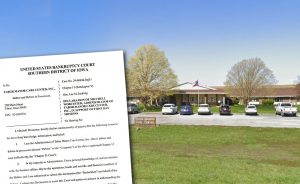Bankrupt nursing home says it owes Iowa taxpayers $1.1 million
August 2nd, 2024 by Ric Hanson
(Fremont County, Iowa) – A for-profit nursing home in southwest Iowa that has filed for bankruptcy says it owes Iowa taxpayers more than $1 million in fees the state failed to collect. The Iowa Capital Dispatch reports that in May, the for-profit Tabor Manor Care Center in Fremont County filed for bankruptcy, listing $1.3 million in assets and $2.3 million in liabilities.
By far, the 46-bed nursing home’s single largest creditor is the State of Iowa — specifically, the Iowa Department of Health and Human Services/Iowa Medicaid Enterprises. The home has reported that it owes the agency $1,169, 257. The debt is tied to unpaid Quality Assurance Assessment, or QAA, fees that date back to 2019, according to bankruptcy records.
Tabor Manor isn’t the first Iowa nursing home to file for bankruptcy after neglecting to pay the QAA fees to the state. In 2021, the Iowa-based QHC Facilities nursing home chain filed for bankruptcy and informed the court that it owed taxpayers more than $3.9 million due to unpaid QAA fees.

Tabor Manor Care Center in Fremont County has filed for bankruptcy while owing the state $1.1 million. (Photo via Google Earth; court document courtesy U.S. District Court)
In 2022, DHHS reported to state lawmakers that of the 379 Iowa nursing homes that were required to spend their increased Medicaid revenue on pay increases for certified nurse aides, 68 of them – or 18% of the total — failed to do so. An additional 37 homes – or 10% of the total – failed to meet a different standard that required them to spend 60% of their excess revenue on compensation for all staff.
Despite the lack of compliance by some care facilities, DHHS proposed a major increase in state spending on the QAA program last year. According to a budget analysis by House Republicans, $111.2 million was appropriated from the Quality Assurance Assessment Trust Fund for Fiscal Year 2024, which ended June 30. “These funds do not revert back to the general fund,” the GOP advised state legislators, noting that it would result in a $68 million increase in revenue for facility owners.
In recent bankruptcy-court filings, Tabor Manor Care Center has said the biggest financial hurdle it now faces is the unpaid QAA fees owed to the state. “In order to continue our important work, the company deferred payment of QAA fee obligations during the COVID-19 pandemic and the post-pandemic recovery period,” the home’s owner and administrator, Mitchell Worcester, told the court.
He said that before filing for bankruptcy, his company tried to negotiate a plan to pay off the $1.1 million debt over a “period of time which matched the company’s ability to pay.” He said the state was “only able to offer a payment plan of relatively short duration, including escalating payments, which the company will not be able to perform to.” Worcester told the court that one of “the principal purposes” of the company’s bankruptcy filing is to address the $1.1 million debt in a manner that will enable the home to remain open.
The company’s goal, he said, is to renew negotiations with the state on a payment plan.





